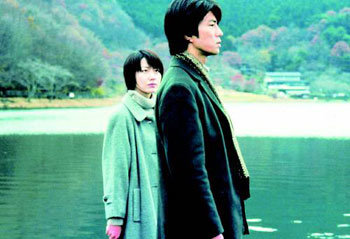2 Ways to Love

Mitsuko, the female lead of Japanese director Manda Kunitoshis movie Unloved, has nothing to complain about in her life. Thus she is happy. She doesnt want to be promoted, so she doesnt even take the exam. However, this doesnt mean she has a lot. Rather, she barely manages to eke out a living. She is the lowest rank public service official in city hall, lives in a small studio, and doesnt even have a boyfriend although she is over 30.
A divorced successful venture capitalist Eiji approaches her. Eiji, who had visited city hall on business matters, admires her perfect preparation of papers and soon recognizes her talent.
Eiji, who is rich, becomes interested in Mitsuko and soon falls in love with her. He buys her expensive clothes and takes her out to dinner at nice restaurants to show his feelings for her. Also, on his way to a trip he requests, Lets live together. However, Mitsuko rejects his request. The reason? Because she doesnt want change. She doesnt feel that Eijis wealth and fame belong to her, and sees the difference between her life and his life as not superiority and inferiority, but that they are just different, and because she is satisfied with her current life, she doesnt want to belong to something that is different.
Her unique character, which rejects wealth just because she is not used to it, when viewed from a modern persons eyes, seems to be the personality of an outsider. In reality, within the movie, Mitsuko feels alone because of the people around her who do not understand her. Those around her ask, Why dont you desire a better life for yourself? Whenever they say this, Mitsuko replies, If people want to label me, they can do what they want. However, Im happy the way I am now.
The director shows us how difficult and attractive it is to acknowledge me the way I am in our society today, filled with longings to satisfy a lack and outsiders endless rage from comparisons. Being satisfied with me right now means having the courage to accept the outcast or outsiders differences, but he shows us that happiness and inner peace come at a price.
Regardless of what other people say, or whether her lover is hurt or not, Mitsukos character, who insists on quietly going her own way, is definitely far from the weak or provocative feminine character, but she is a new woman for this generation. Of course, Mitsukos personality can also be seen as Japanese societys inability to get out of a long low growth slump, the product of the realization that No matter what you do, nothing gets better.
Although Mitsukos life looks like she has been rejected in the beginning, ultimately as the people around her tune into her wavelength, they exhibit a new manner of mutual understanding. Shimokawa, her second boyfriend, who was so wrapped up in others tastes, views, and standards that he lost his own way and ended up wandering, finally understands her. This time I choose you, he says.
The title Unloved, which takes its title from the movie Unforgiven, can be translated as One who could not receive love. It is a metaphor for Mitsuko, who is preoccupied with self-love. The film will be shown on May 24 at the Seoul Film Forum. Ages 15 and up.
Mun-Myung Huh angelhuh@donga.com
Headline News
- Iran blames US sanctions for helicopter crash that killed president
- Pres. Yoon vetoes investigation into death of marine
- “Croatia Holds a Business Forum in Seoul…Looking forward to the development of trade relations”
- Samsung names new chief for semiconductor business
- Seoul City plans to expand welfare benefits







